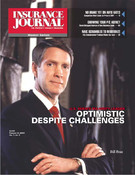He came to Washington, D.C., with a background steeped in medicine.
U.S. Senate Majority Leader and Tennessee Republican Bill Frist has known first-hand the impact of the nation’s medical malpractice crisis and how it can paralyze the entire business sector, from insurers to doctors.
Born and raised in Nashville, Frist graduated in 1974 from Princeton University. In 1978 he graduated with honors from Harvard Medical School and spent the next seven years in surgical training at Massachusetts General Hospital, Southampton General Hospital in England, and Stanford University Medical Center. He is board certified in both general surgery and heart surgery.
In 1985 Frist joined the faculty at Vanderbilt University Medical Center where he founded and subsequently directed the multidisciplinary Vanderbilt Transplant Center, which under his leadership became a nationally renowned center of multiorgan transplantation. A heart and lung surgeon, he performed more than 150 heart and lung transplant procedures, including the first successful combined heart-lung transplant in the Southeast.
Frist was first elected to the U.S. Senate Nov. 8, 1994. In 2000, he was elected to a second term by the largest margin ever received by a candidate for statewide election in the history of Tennessee.
Frist recently set time aside to discuss the med-mal crisis and where he sees the nation going in the new year. Below is a transcript of the interview, which was conducted by e-mail.
Insurance Journal: With 19 states’ medical liability systems listed as being in “crisis mode” by the Americal Medical Association, do you see things getting worse before they get better?
Sen. Frist: In 2002, only 12 states were in crisis according to the AMA so the problem is steadily growing. Because the problem is a result of excessive litigation, I don’t see the situation dramatically improving until Congress passes comprehensive medical-liability reform.
The good news is that Congress is starting to hear the voices of patients and physicians. Last year, the House of Representatives passed reform and, as majority leader, I have made medical liability reform a top priority for the Senate.
Last July we brought medical-liability reform to the floor of the Senate for the first time ever as its own bill. Unfortunately, the measure-the Patients First Act -was blocked by opponents who filibustered the mere consideration of the bill. However, this was just the first attempt at this important issue. We will bring reform up again this year, and I encourage physicians and patients who have been affected by the crisis to continue to contact their senators.
IJ: Has the Senate, House, White House, etc. looked to California and the five other states that passed a version of tort reform as a model states should go by?
Frist: Yes. The bill that passed the House last year and the Patients First Act are based on California’s successful model which proves that comprehensive reform works. California passed its medical liability reform measure—MICRA—in the 1970s and the results have been dramatic. For example, total liability premiums grew in California 182 percent from 1976 to 2001 compared with 569 percent for the rest of the country. Not surprising, California’s doctors and patients have been spared the nightmare facing other states.
IJ: How has your background in medicine helped you in the medical malpractice debate?
Frist: I know first-hand what it is like to dedicate your life to helping patients, and what it means when quality doctors are forced to drop valuable services or even leave the profession altogether. I stress again and again to my colleagues in Congress that excessive litigation has never made anyone better or improved health care and that the ultimate losers are always the patients who see their access to quality care disappear.
What makes this situation so tragic is that highly qualified and committed doctors, many of whom I know personally, are literally being forced from the fields of medicine that they so cherish. We are not talking about a few bad doctors, but rather the very best men and women in their profession who have devoted their professional lives to healing others. They do not want to drop vital services, leave already underserved areas, refuse to see expectant mothers or refuse to give emergency care, but the current situation gives them no other choice.
I also try to explain to my colleagues about the other costs associated with our current medical liability system like defensive medicine. All doctors must be careful and prudent in providing care, but they should not be threatened by excessive litigation into taking expensive and unnecessary steps. This action does not improve care or help patients it only increases costs for all of us. Though the numbers are hard to quantify, one government report estimates that reform could save the country as much as $70 billion to $126 billion in health-care costs annually.
IJ: What do you look at as your accomplishments as a senator and majority leader, and what are your future goals?
Frist: Back in January, we set an ambitious agenda. We resolved to get the economy back on track, lend critical support to the war on terror and promote the public health here at home and abroad. Our mission was to expand freedom and opportunity, and strengthen America’s security. During the first session of the 108th Congress we made major strides towards those goals.
We first set to work passing 12 of the 13 spending bills left undone by the previous Congress, and we passed 11 of those bills in just three weeks. We also passed a budget to establish a blueprint for creating jobs, investing in homeland security and education, providing Medicare prescription drug coverage and offering health insurance for America’s children. During the first part of this Congress, the Senate was in session 167 days during which there were 459 recorded roll call votes and 575 measures were approved.
After six years, we were able to approve comprehensive legislation to give 40 million seniors and citizens with disabilities an improved Medicare system including a prescription drug benefit. The new law will give our seniors better health care, access to preventative care, and make prescription drugs more affordable.
Under the president’s leadership, we passed $350 billion dollars in tax relief, the third largest tax cut in history. We cut taxes, across the board, for 136 million hard working, tax-paying Americans. For America’s families, the legislation increased the child tax credit from $600 to $1,000 per child and sent the checks out immediately.
The Senate also authorized $15 billion during the next five years to treat those afflicted with HIV/AIDS and to promote measures to stem the spread of this virus. This historic investment will improve the lives of millions living throughout the world.
We provided significant funding for the war on terrorism including continued support for American troops and rebuilding efforts in Iraq and Afghanistan. With the capture of Saddam Hussein, the Iraqi and Afghanistan people now welcome a real opportunity for long-awaited peace and stability. And these are just a couple of the many things the Senate accomplished for the American people last year.
Looking ahead, I hope we’ll be able to continue the good work of the last year. We will build on the success of this year’s appropriations process and tackle all 13 appropriations bills so that government can perform its basic function to serve the people. Beyond appropriations, education, the uninsured, tax policy, welfare reform, litigation reform, judicial nominees, and energy policy are just some of the challenging issues ahead. But I’m confident that the Senate will work hard for the American people to meet these ambitious goals.
To comment on this story, e-mail: dthomas@insurancejournal.com.
Was this article valuable?
Here are more articles you may enjoy.


 Charges Dropped Against ‘Poster Boy’ Florida Contractor Accused of Insurance Fraud
Charges Dropped Against ‘Poster Boy’ Florida Contractor Accused of Insurance Fraud  Zurich Insurance’s Beazley Bid Sets the Stage for More Insurance Deals
Zurich Insurance’s Beazley Bid Sets the Stage for More Insurance Deals  Maine Plane Crash Victims Worked for Luxury Travel Startup Led by Texas Lawyer
Maine Plane Crash Victims Worked for Luxury Travel Startup Led by Texas Lawyer  What Analysts Are Saying About the 2026 P/C Insurance Market
What Analysts Are Saying About the 2026 P/C Insurance Market 


